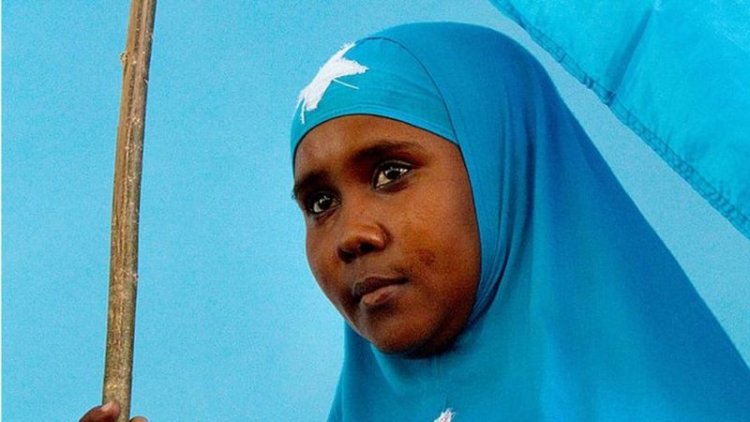Elections in Somalia - where the people do not vote
Once a new government takes office, it will have to address Somalia's challenges - including the drought. It has been worsening in the last three years and aid agencies are now warning of famine.

Somalia's new MPs will be sworn in soon after a one-of-a-kind election for the country's parliament, known as the House of the People. People, on the other hand, did not vote in a poll that dragged on for a record four months - more than double the time it took to hold India's election, the world's largest democratic exercise, in which more than 600 million people cast ballots.
Only a few thousand individuals voted in Somalia for a parliament to represent the country's 16.3 million people.
This is due to Somalia's convoluted and indirect political system, in which political parties do not run for office. Elections with a one-person, one-vote system are also not held.
Instead, delegates appointed by clan elders and members of civil society picked by regional state authorities elect the 275-member House of People. Following that, the MPs elect a president to lead the country.
The Senate, a 54-member lower legislature that represents Somalia's five regional states, also votes in the presidential election.
It shows the power of clans in Somalia - they form the backbone of a society in which Western-style democracy has not taken root.
They also fill the vacuum created by the absence of a functioning state - Somalia has not had one since the socialist regime led by Siad Barre collapsed in 1991.
Because Somalia's clans are fiercely competitive, the system is based on a power-sharing formula in which the four largest clans each get an equal number of parliamentary seats, while the remaining clans are grouped and granted half the number.
As a result, Somalia's clan leaders act as political kingmakers.
Following the elections for the two legislative chambers, the majority of them will be sworn in as MPs later on Thursday. However, several regions' elections have yet to be completed due to disagreements over a variety of issues, including candidate eligibility.
Other MPs' inaugurations are unlikely to be delayed as a result of this.
Massive corruption, abuse of authority, and contempt for electoral procedures shook the elections. Millions of dollars are thought to have been spent on delegates in some situations.
Unfortunately, the country lacks mechanisms capable of combating corruption.
Qatar is a significant political player. Analysts say it funded incumbent President Mohamed Abdullahi Farmajo's campaign in the 2017 election on its own and had extensive access to his administration.
What will be the new MPs' priorities?
Huge public pressure exists for parliament to move swiftly to elect a new president, as President Farmajo's term expired in February 2021.
But he remained in office because political bickering and the lack of preparations delayed the parliamentary election, leaving him - and lawmakers - without a mandate to govern.
The parliamentary election was finally held under pressure from Western donors - including the US which restricted visas for officials seen as undermining the electoral process.
The International Monetary Fund (IMF) said it could stop financial support for Somalia by mid-May if elections were not completed.
Once a new government takes office, it will have to address Somalia's challenges - including the drought. It has been worsening in the last three years and aid agencies are now warning of famine.
More than 3.5 million people need food aid, and 1.4 million children face severe malnutrition.
What is the West's motivation for intervening in Somalia?
The spread of extremist Islam is their main concern. Al-Shabab, an al-Qaeda affiliate regarded as Africa's most dangerous, has its headquarters in Somalia.
After US-backed Ethiopian troops attacked Mogadishu to depose the Union of Islamic Courts (UIC), militant Islam flourished in Somalia roughly two decades ago.
As a result of the UIC's failure, al-Shabab grew in strength, vowing to expel the "invaders."
Al-Shabab now controls much of Somalia and conducts frequent operations aimed at toppling the government and establishing Islamist rule.
After criticizing clan elders for participating in what is considered un-Islamic elections in 2012 and 2016, al-Shabab threatened and even kidnapped them.
This time, it has been more subdued in its electoral response, amid concerns that members or sympathizers may have surreptitiously sought parliamentary seats in an attempt to destabilize the system from the inside.
The fear was publicly expressed by neighboring Djibouti's President Omar Guelleh in 2020 when he was quoted as saying: "I fear we will end up with a parliament indirectly controlled by al-Shabab because they'll have bought the support of some of the MPs."
Some analysts felt Mr. Guelleh was exaggerating the possibility of al-Shabab gaining a foothold in parliament, but there is no doubt that it is a major political force in Somalia.
Is Somalia on the verge of becoming a democracy?
Long ago, Somalia's power brokers agreed that one-person-vote elections would be held this year, but they failed to deliver on their pledge.
That was unsurprising, given that several crucial requirements, including political party registration and referendum adoption of a new constitution, were not met.
It's uncertain how much of a priority it will be for the new government, which will face a slew of major difficulties.

 Boakyewaa Lawrencia
Boakyewaa Lawrencia 


































